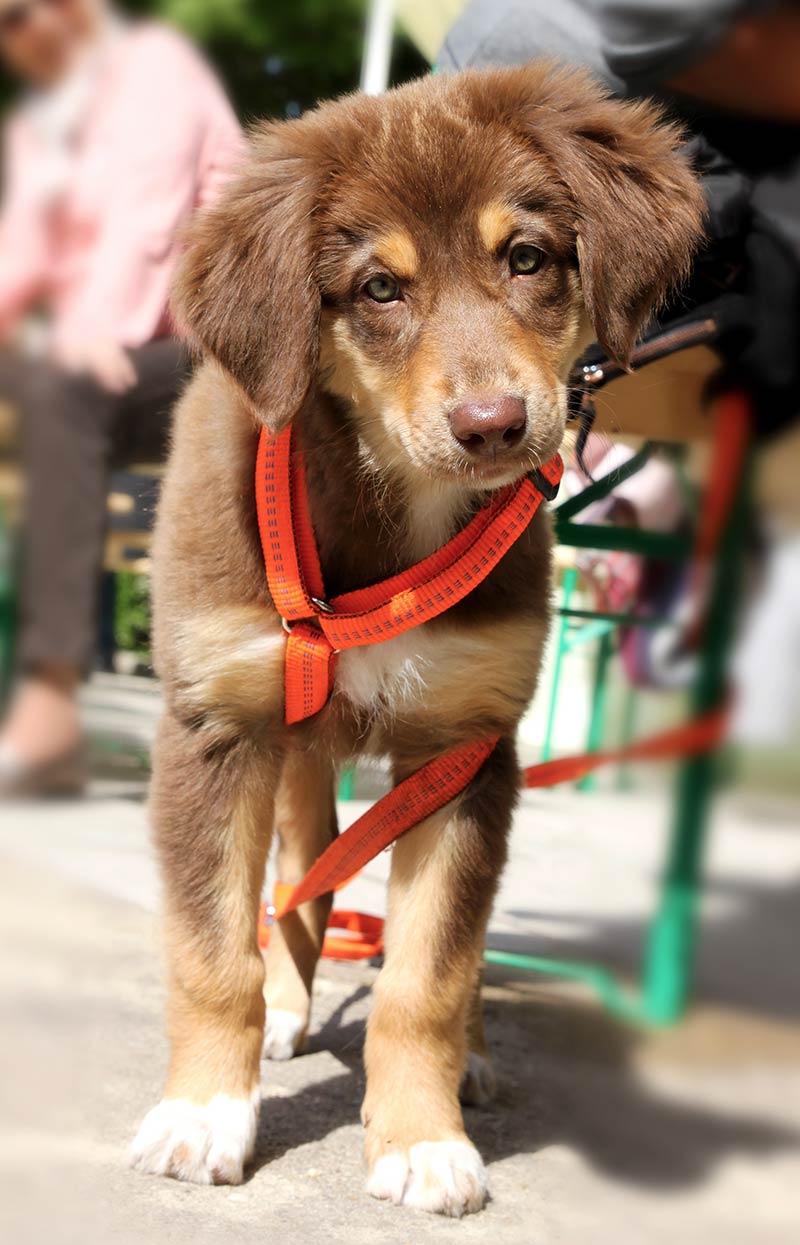Your puppy search starts here! Finding a puppy is incredibly important, and picking the right litter will set you up for the best possible dog owning experience. Today we share the ultimate guide to finding your perfect puppy. Discover our dog breed selector and in-depth dog breed reviews.
Contents
- Are you ready for a puppy?
- Which type of dog
- Different dog shapes
- 8 dog types to avoid
- Temperament and friendliness
- Dog Breed Selector
- Dog Breed Reviews
Today we’ll learn how to choose between mixed breed and purebred dogs. Find out how to choose the right size and breed of dog for your family and much more.
The guides are brought to you by Pippa Mattinson, author of best selling dog books: The Happy Puppy Handbook and Total Recall. Pippa will show you how to avoid common mistakes when choosing a breed of dog to share your life with. And she’ll show you exactly how to find a puppy that will suit your family and circumstances
Your Puppy Search
- Buy or Rescue?
- How to adopt a puppy from a shelter
- How to avoid a puppy mill
- Where to start looking for your puppy
- Making sure your puppy is healthy
- Choosing your breeder
- Male or female puppy
- One puppy or two?
Use the links above to find expert guidance on every aspect of choosing and finding the dog of your dreams. Find out which dogs are healthy, which dogs are easy to train. Which dogs live the longest and much much more.
This unique online resource has been created specifically to help new puppy buyers and anyone thinking of bringing a dog into their lives.
It’s divided into two parts. Part one “The Right Dog” is all about deciding what type of dog is right for you. And part two “Finding Your Puppy” is all about finding your perfect puppy. Each part has its own menu above
Can’t I just go and buy a puppy from the mall?
The idea of just buying a cute puppy on the spur of the moment is very appealing, but we strongly recommend that you don’t.
Puppies for sale in Malls, or street markets, or advertised on websites are sometimes very sickly and may grow up to be aggressive.
Or they may have other problems that will drain your wallet and profoundly affect your life.
The mother dogs used to create these puppies for sale are often badly treated.
So it’s important that you do this the right way.
Just as importantly, you’ll have much more fun if you follow our guide.
And avoid some potentially very expensive mistakes
How to get started with puppy search
The guides are numbered in the order of the steps you need to take, and we recommend that to start with you read them in order.
You can use the pink menu to return to the guides that interest you or to look up important information as you progress in your search
The information you need – all in one place
You need your puppy to be the right puppy for your family.Getting a puppy will change your life. We want that to be in a good way.
And that means gathering information and making decisions
Puppy Search is more than just a collection of helpful tips to assist you in finding your new friend.
You’ll find a growing collection of dog breed reviews on this site, but the puppy search series goes further. It helps you match your family to the perfect breed for you.
We believe it’s the most thorough and comprehensive guide to getting a new puppy you’ve ever read.
What is in the guides?
Purebred dogs have been divided into groups depending on their original purpose and you’ll discover how each dog breeds origins can affect that dog’s behavior both inside the home and out.
But don’t worry, we won’t be leaving mixed breeds out.
We’ll also look at how size and shape affects the way a dog fits in to family life and even the health of your dog.
You’ll discover which dogs are great for children, which dogs are the most healthy and which are the most sickly. And we’ll look in detail at the purebred versus mixed breed debate.
There may be a few surprises along the way, hopefully many of them will be pleasant ones. The most important thing is that you have honest and clear information available with which to the right choices.
Caring for your new friend
Health is an important part of Puppy Search, simply because health and happiness are so closely linked.
Once you have chosen a healthy puppy, you can look forward to a lifetime of pleasure and happiness with your new friend.
Caring for a puppy isn’t always plain sailing.
Of course there will be some challenges along the way, and we can help with those too.
So you’ll also find links to the latest information on puppy care and training as you go
Let Puppy Search be your guide
We hope you enjoy your own Puppy Search journey. And don’t forget to add your questions and comments in the box below







Carroll Carchietta says
Hello there. I am hoping you can help me. My mom recently lost her beloved Yorkie just 6 days short of his 13th birthday this past June. She is devastated and would love to have another one. I have been researching the Parti Yorkie but have not found any reputable breeders in the NY/NJ or Pennsylvania area. Can you help me? Thank you.
Carroll
renee keglovic says
we just lost our swiss mountain dog. we are devastated and want another one. Could be a mix of australian shepherd or bernese? we will love him or her forever—please help us!!??
Mimi says
I recently lost my lab Shar-Pei mix and I would love to get another one. She was about 52 pounds and love to go on walks on trails outside my house. This mix is very hard to find.
bettye goins says
I’m looking for a AKC registered, 8week old fawn, female , pug. I’ve been searching for a long time now.
Robin says
Were looking for another Dox bull (Pit/Weenie) Male or female. We have a 6 year old male that is about to loose his 15 year old companion. Would love to have another pup for him to teach manners to. He’s the best little companion.
Sheri G. says
We are looking for Mauzer (Miniature Schnauzer/Maltese). Our Marvelous Mauzer Boys were our constant companions for 14 1/2 and 16 1/2 years respectively. We would love to find new forever fur-babies.
Susan Kroninger says
I am looking for a great bernese puppy.
Mitch says
Hi!
My name is Mitch and I am currently looking for a Golden-Corgi mix. Our dearest member of the family recently passed away and through a medium, we were told that he would be returning to us as such. I am greatly interested in finding our furry heart anywhere we can. Please help!
Miriam Mellett says
Hi, I am in search of a female Boglen, (Boston Terrier/Beagle), as I recently lost my precious Dakota. I live on Long Island, NY. Please let me know of any breeders you can connect me with. Thank you, Miriam.
Colleen says
I’m looking for a great dane/shephard mix puppy. Please provide any guidance on breeders.
Steven VALEERE Sass says
I have had 6 shelties over the last 40 years and my last, a mini was hit by a car, even though I have an invisible fense around property — it was 6 days before his birthday July 16. DESPERTE for another mini- male puppy — any guidane would be most appreciated’
Steve
Baltimore
Valerie. Waugh says
I’m looking for a tiny Yorkie female. Free if possible,dark brown and light tan
Stacy says
Looking to add a new family member, a Pitmation. A puppy or young dog. Would prefer a girl, not for breeding. I need a hiking & kayak buddy.
chris says
Hello Good Morning we have been looking for ages to find a golden retriever puppy but haven’t found it if you could help that would be amazing we looked at safari, google, and every online pet store but we have not found one can you help us find one
Glenn says
Like the site:) Having a lot of difficulty finding a Doberman Shepherd cross, INFACT Impossible. We had a female of this breed for 18 years, My best friend. We had to put her down 25 years ago. Haven’t had a dog since, but would like to rekindle that love and care with another, but having no luck. These are a extremely dedicated dogs with intelligence and love. Will never turn on you, and will be your best companion. If you can suggest something or someone that would be awesome. Thanking you in advance.
Jeremy Cuthbert says
My wife and I have done our research on breeds and have settled on the newer breed Mini Hippo or Cocker-Pei. We live in Dallas, TX but can’t seem to find a breeder anywhere. Im willing to drive across the US if necessary. There is one pet store here Petland. But they are asking $8500 for a puppy. We are willing to pay for a good breeder but not looking to finance something at the cost of a used car.
Any help?
Toni says
I am looking for a Lagotto Romagnolo puppy. I live in central Virginia and work from home. I am very active and love to hike and kayak. Thank you!
Karen says
My husband and I are looking for a Standard Schnauzer puppy. We live in Ontario, Canada
karen E lafave says
We are recently retired and are looking for a miniature Golden Retriever puppy. Do you know of any breeders in Michigan or Wisconsin areas?
William Armendizo says
Looking for a reputable breeder for a boxer zbull Mastiff puppy. We had 3 until last month when we lost one to cancer after 9 1/2 years of love. Please contact me if you know of a good breeder. Thank you.
Gayle Stookey says
We recently lost a Havashu pet and are looking for another puppy in the Syracuse, NY area.
Delaney Barr says
We are looking for a Pitbull husky cross puppy in L.A. Area but we are struggling to find one. Any recommendations?
Holly says
Hi, I’m looking for a Jackapoo (The Jack Russell Poodle Mix) puppy, can you provide me some good breeders in Toronto, Ontario, Canada? I try to google it but nothing found, please give me suggestion or seller. Thanks alot🙏🏻.
fletch says
Im looking for lab great dane/labradane but I CANT find one! Please help me find one!
John Harris says
I am looking for a German Shepard / Siberian Husky mix, male, black & tan with two blue eyes and less than 8 weeks old. any & all help would be greatly appreciated!
Paula Gamer says
Looking for a Cocker Spaniel mix, preferably with a Pom or Pekinese. Any ideas where I could find one? Willing to fly anywhere in US.
Vicki says
Good Morning !!! My name is Vicki ! My husband and I have been waiting for a great bernese puppy anytime, unfornunatly during a time of my mom passing I lost the contact info. I need help in locating a new best friend/working dog !! we lost our pernese last spring ( he was 17 yrs.) what a true friend and worker and currently are still with our Newfie whom is about to turn 18. We live on lg. acerage with live-stock and are loving/caring dog parents with no children. We need you help in locating a “Great Bernese” puppy or possible rescue. Even breeders whom may be breeding this mix or a mix of great pernese/newfoundland, may need both !!!! thank you for any help you may provide us and have a most awesome afternoon !!! Always, Vicki Boynton
Storm says
try a alaskan malamute its almost the same as the bernese
Maria says
Can anyone help me find miniature poodle breeders that are drivable from the suburbs of Chicago? I am willing to drive a couple of hours. I have been looking for minis but I am having a hard time finding litters available or even upcoming litters. Any help is appreciated. Thanks
Edward Giancaterino says
I live in the Denver metro area and looking for a Shih Tzu or mix puppy
christine monge says
am looking for a mini hippo breeder
caryl parker says
we are looking everywhere for a whipador puppy. Any help?? We are in AZ Thanks, caryl
Chantal Grootaerd says
Hey,
I am looking for a miniature chow chow puppy, white , female. Can you help me please. I am from Belgium.
Thanks.
luis colina says
am looking for a puppy or young dog,schnauzer,goldendoodle,i live in brossard,quebec,section s,have a house with fenced yard with grass,ready to pay or adopt,reasonable price please,i have toys,dog food,collar,leash,walks every day morning,afternoon,car sighseeing in montreal,i had dogs 20 years,sharpei,goldendoodle,and for a while ,i had for almost a year 2 little female dogs,1schanauzer, another ,mix breed schnauzer,with maltais,please help me,i ve been 3 months without dogs
marty aronovitch says
I am looking for a f1b black and white male mini bordoodle puppy
very interested in training
Kat says
I am looking for a male cavachon puppy in the Raleigh/Durham N.C. area. Hoping to find a reputable breeder.
Kelly says
I am looking for a Labradoodle. I live in both Naples, FL and Charlotte, NC.
Lillian Christine Hart says
I am looking for a “Boxador”, Labrador/Boxer mix. preferably puppy but would consider an older dog. I live in very northern California near Mt. Shasta. We have a large fenced yard and lots of hiking trails which we would want to hike with our dog. We have no other dogs at this time, only one cat and two horses. Thanks for any help you can give me.
Christine
Sammy Thomas says
Hi we are trying to get a puppy we don’t know how to train it haven’t got it yet
Paula says
We are looking for a lab/rott cross or a lab/Rhodesian cross female puppy. Please help us. We have been looking for over a year.
christine says
Hi, I am on long island in ny & have a nice size fenced in yard & i am very active & always have children around. I am looking for a lab/vizla mix or lab/weimaraner mix.
Any information would be great!
Thanks, Christine
Bill hill says
I am looking for a mixed breed, miniature poodle and Cavalier King Charles spaniel puppy
Gina Rodriguez says
My family and I are searching for a Pitbull Husky mix. I had one growing up and have been desperately trying to find another.
Victoria Melton says
Hello- My husband and I are looking for one or two Doxles (puppies). Our dog of 16 years old passed away about 4 months ago and we want another friend for our home. Let me know if you have a litter of pups!
Kelly says
I am looking for a Aussie Corgi mix breed, in Alberta Canada 🙂
David Farris says
I’m looking for a Goldendoodle “medium” and “straight hair” female dog. Also, considering a Austalian Retriever (Golden Retriever + Australian Shepherd) female dog. Please contact me if you can help.
Linda Lee says
We are looking for a havenes Bichon mix
ray says
I am looking for a Lhasa Apso and Sheltie mix preferably male. Nearly found one but litter went quick.
Sam Smith says
HELP HELP HELP. Me & my family are looking for a female golden DOX. Have no luck at all, please in anyone knows of anybody please reach out! Thanks!
Shiv says
Hi, we are looking for a lab and pitbull puppy to buy from a certified breeder in IL. Any help would be appreciated. Thanks
Anthony Smith says
Hi I’m looking for a pitbull and rottweiller mix breeder.
Thx you in advance
Greg says
I’m looking for a blue healer / border collie or Australian Shepard mix. I have a dog that’s needs a buddy. Female preferred.
Gerard Doyle says
Can anyone tell me where I can find a shepherd Labrador pup breeder ?
Angela Chargin says
Hi, my family is looking for a pitt bull mastiff pup for sale or adopt anywhere in the state of Georgia. We recently lost our 11 yr old of the same breed and our home is way too quiet now.
Kylie Sibulo says
Hello!
im trying to find a cavachon puppy in the los angeles area to adopt or purchase.
Please help me!
Leanne says
Hi i am looking for a cavapoo but cant seem to find any to buy at the moment. Looking for one that will be ready to be homed in the next few weeks. Thank you
Beth says
Hello!! Our family is looking for a Goldador puppy to join us. I’m finding it hard to find proper breeders (I’m in WA). Does anyone know where I can look?
TIA
Michael Patrick McKay says
looking for a female blue heeler for my male 7 yrs old need a great dog or 2
My male is perfect in all aspects being my dog.
allie says
HELLO,
I am looking for a mini bernadoodle tri color, or mini bernese mountain dog, preferably female
Susan says
Hello I am looking for a female Maltese I want to meet the parents and puppies first. I live in nj. But can easily travel to ny conn and mass. Does anyone know of a good breader. Thank you
stacey says
Hello, I’m looking for a Golden Cocker Retriever. Any recommendations for breeders? Thank you!
Sharon jackson says
My beautiful Lab/Chow passed away a week ago. And we have no kids and our fur babies are our kids, we looking for a Black female
Lab/Chow puppy, any help, much appreciated,she will be pampered and live inside heat +AC,Queen of the castle..
Helen says
I am trying to find a papillon/chi mix puppy- preferably a puppy that will be around 4-5 lbs full grown. I already have one and he is 12 yrs old and the best, smartest dog imaginable. I am disabled so I can’t afford to pay alot but it would have the best home.
Erica Ju says
Hello,
I am looking for a Jindo male. I live in Virginia Beach, VA. Could you help me find information on where I can adopt/rescue Jindo dogs? Thank you.
Lucy says
Hi Erica, You can get more information on finding a good breeder for a Jindo puppy here: https://thehappypuppysite.com/korean-jindo/
Pauline Zimmermn says
I’m looking for a black (runt of the litter) cockapoo puppy.
Lucy says
Hi Pauline, You can find information on buying the runt of the litter here: https://thehappypuppysite.com/runt-of-the-litter/ Unfortunately, these very small dogs can come with big health problems, so make sure you do some thorough research.
Cleone Cannon says
My Jack Russell went to the rainbow bridge last August 15th, 2018. I miss him so much but because I had to move, I couldn’t get a new companion until I moved into my new place. Now I’m here, I can’t get a new puppy because I have too much stuff on the floor. I hope to have it done any day now. I’m looking for an adult Min/Pin or a Chihuahua or a dog small that doesn’t shed. Must be house broke and not a winning barker, reasonably quiet. Please help me…
Jill Meadows says
Hi, I Just lost my fur baby a little over a month ago. It has been really hard on me. She was my life. She was a boxer/pit mix and the most amazing dog. Loved everyone, loved her laser, and her hedgehogs that grunted. I am looking for another puppy like her. Not having any luck. A new one will never fill the hole in my heart but would help me not feel so alone. I live in Utah.If anyone knows where I can find a little female for me to adopt please let me know
Thank you Jill
Gerry Matthews says
I’m looking for a Portuguese water dog / wheaten mix female puppy.
Cant find any available. Any leads would be appreciated.
Brian James Willoughby says
I had a shih tzus that just passed, I’m looking to replace her and I was thinking about getting one of the teacup shih tzus.
My Research indicates that they’re basically runts that have been bred together and are prone to health problems. Do you have any more insight on this?
jacqueline says
Hi,
We are living in Belgium and are looking for a well bred healthy red golden retriever.
Are there any breeders that you know of in Belgium or Holland that breed safely?
or is there a way to find a breeder abroad?
Emily Church says
Hi!!!
Our family of 3 is in a desperate search to find the most perfect, handsome little man of a teacup yorkie, and are hoping you can potentially be someone who is willing to help. We live in MA, but travel isn’t an issue for us; 10 year old daughter who has a puppy to are for at her dad’s house so she is very confident and comfortable & we only have one pet ; a peacock slider turtle, who stays inside her elevated 40 gallon tank.
Any type of advice or assistance that you can offer, our family would be forever grateful. Have a blessed Sunday!
Best,
Emily C
Lucy says
Hi Emily, This article might be of interest: https://thehappypuppysite.com/teacup-yorkie/ Best wishes, Lucy
Craig Disney says
Looking for a deer Chihuahua puppy with the longer legs
Julie R. says
Hi,
I’m looking for a breeder
In Colorado who breeds
Dockers.
I would love to find one soon because we lost our Docker last year and are ready to have a new addition in the family.
Katie White says
Hi I’m looking for a pitsky (Pitbull Husky mix) puppy or dog for my boyfriend and his roommate. I live in Colorado does anyone know of anyone selling them?
Lu says
thank you for taking the time to post. It helps!!!
Phillip Cuthbertson says
I’ve had dogs all my life…the last 4 were border collies….2 at a time so they had company while I was at work……they were wonderful….and now I’m retired and too old to have collies again……they are very active needing lots of exercise which I could not handle….I’m currently considering a cavpoodle toy variety….they are very expensive…..$5000…..and I just don’t know whether to go for one…i live own and although not wealthy I’m comfortable….$5000 is a lot to me and i really dont know what to do they…being small dogs live for a long time…..so I’m a bit concerned what will happen when I mark it….i doubt whether this is something you can help me with……probably the decision is up to me…..but I’m just writing to you….for your thoughts
Debra says
I just lost my 12 year old Lab/Golden mix about 5 months ago. Now I am ready to adopt. Do you know of any reputable breeders in the Delaware/Pennsylvania area?
Beth Bergvall says
Hello,
I live in Norway and I have read ‘Choosing the Perfect Puppy’ and the happy puppy Handbook with great interest. Our family are looking for a Cavapoo Puppy in the U.K.
I would be very grateful if you might know of any breeders that you could recommend?
Thank you so much.
JOHN P BLONKENFELD says
Hi, we are wanting a Maltese mix of some kind and more on a potty trained dog if possible.
Margie B says
I owned two Maltese over the years and find them to be incredibly difficult to house break. As for a Maltese mix, I have heard from a few people that poodles can be nervous & high strung so that mix does not bode well.
Wendy Jackson says
We are looking for Bichon Poodle mix Had one for 18 yrs and he was wonderful.
Thank you
Pat Pruitt says
Hi. I am looking for a female ShitPoo dog. (1-2 years). If u know of any please let me know.
Julia Handley says
Hi I am researching to find a puppy; now I am retired I would like to become a registered breeder.
From the age of 15, I have always had my truly wonderful Labradors. But now I am older and cannot give them the long walks they so enjoy.
I am looking for smaller dogs to breed. I wonder if anyone can point me in the right direction to become a good and responsible breeder.
Pam says
I am looking for a miniature toy poodle possibly to brain if you find one please let me know
Bonnie says
I’m looking for a teacup Labradoodle and can’t find them anywhere. If you find any please let me know.
Bonnie
janice taylor says
We lost our beloved Mollie. She was an Australian/blue heeler cattle dog. We are now considering another dog. How do i find a reliable breeder? Also, i need to know if the breeders get the puppies tested for certain diseases for this breed.
Dusty says
Hi Janice,
I’m currently looking for a puppy too and if you’re in Australia or New Zealand, dogzonline has breeder listings by state/territory, and the listings often mention what tests the puppies and stock have!
Emma Krock says
I’m looking for a shih tzo can I find a valuable pet? I can’t afford a fortun
Diane Loughery says
Hi I’m looking for a terrier/chihuahua mix. Preferably not a puppy.
Thank you,
Diane
Diana Seidel says
We adopted a Deer Head Chihuahua 3 months ago. Healthier than the Apple head, a bit bigger, very loving.
Sandra says
Yes we had one of these sweet little dogs years ago I wouldn’t mind a terrier/chihuahua or a snorkie saw one at the car boot with his owner and fell in love with him dosent have to be a puppy . Where can on go to find one of these please ?
Ruby says
I have a female Chihuahua. She was a stray. She is house broke. I’ve had her several months now but she needs a new home cause I can’t keep her anymore. She’s ok if she has someone with her mostly. She can be noisy sometimes. She sheds a little. She’s super sweet. I live in Nevada. She doesn’t get along with other dogs too well and doesn’t appear to get along with baby’s either. She seems to be in good health. She doesn’t seem to be very old.
Andy says
Dear Pippa
I had decided to by a Golden Retriever and buy one via the KC Assured Breeder scheme, but reading your book Choosing The perfect Puppy it was obvious that they have many serious health problems. I have recently been looking into getting a cross between a Golden and a Miniature Poodle, hoping that its health would be better and also for size reasons. However I am very doubtful of buying anything on the internet, let alone a puppy. Have you got any advice how best to find a a responsible breeder, somebody that also knows the parents and grandparents of both the dog and female dog? Any suggestions of good websites or forums in England that I could read/join to find a responsible breeder for this type of dog? This will be my first dog.
Anna Hammond says
Your dogs on this site are really cute and adorable, especially the terrier mix and chorkie. I love dogs.
Sherry A Banton says
My name Sherry and I’m looking for a pomeranian puppy for my daughter birthday please I need help I don’t want to let her down her birthday on friday
Genice Hanson says
Hi, I love both golden retrievers and cocker spaniels. I have been looking at different breeds and reading a lot of information.
Do you know of a reputable breeder near Arkansas or Tennessee. We live in North east Arkansas.
Thank you, Genice
elizabeth andrea maier says
I am in love with the corgi husky mix and would love to find one from a reliable source! I live in California. Can you help me?
Jenny Hemming says
I am looking for a black labrador crossed with a golden retriever puppy that will be ready to leave its mum in the Spring. Do you know of any breeders that will be having any litters around that time.
Bob Landau says
Since mini golden retrievers are not a recognized breed yet, how can I get information?
Lucy says
Hi Bob, We’ve got an article on them here: https://thehappypuppysite.com/miniature-golden-retrievers/
Pippa says
Hi Dan, check out our guide to French bulldogs – lots of info there . https://thehappypuppysite.com/french-bulldog/
Brayolen says
Hey Love It
Hannah says
Where do you buy Bull Terriers? I have enough money to buy one but where do you get it from?
Lucy says
Hi Hannah, Here is our complete guide to Bull Terriers: https://thehappypuppysite.com/the-bull-terrier/
trish says
Is there any reason you don’t have inforomation about Chow dogs? I benefit from the labrador info but I also have a new Chow. Thank you.
Pippa says
Hi Trish, we’ll be covering all breeds registered with the kennel club. 🙂 There are quite a few of them so we are working our way through steadily 🙂
Jessica says
Hi there 🙂 Iam just wondering if you could help me, I’m looking at buying a puppy Labrador but I can’t seem to find any for sale :-/ I live in Townsville, QLD, Australia. Do you guys know of anyone that has any Labrador litters for sale??? 🙂
Thank you,
Jessica 🙂
Pippa says
Hi Jessica, You need to find a responsible breeder, we’ve got some articles coming up which should help. In the meantime, I think the equivalent of the Kennel Club in Australia is the Australian National Kennel Council, so they might be a good place to start. There is also a good not for profit website in Australia called Pets4Life who may be able to help you. Good luck with your search 🙂